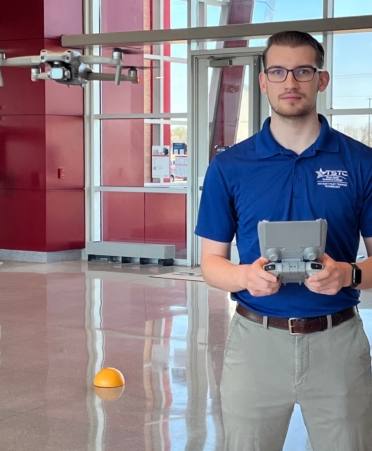(WACO, Texas) – A group of students recently spent part of a morning flying a small drone within a coned-off boundary inside the terminal at Texas State Technical College’s Col. James. T. Connally Aerospace Center at the Waco campus.
The students are taking classes to earn a certificate of completion in Aircraft Pilot Training Technology – Unmanned Aerial Vehicle. The buzzing sound from the drone drew some people’s attention as they walked by.
Ethan Moffatt, of Green River, Wyoming, came to TSTC to study in another program but changed to work on the drone certificate.
“There are a lot of possibilities you can do with a drone,” the U.S. Coast Guard veteran said. “You can work in agriculture, real estate, inspections, cinematography.”
Moffatt said his goal is to work with law enforcement agencies to provide drone services. He said he also has an interest in how the military uses drones.
“A lot of police forces are starting to use drones for search and rescue programs,” he said.
Cody Witt is assigned to the Waco Police Department’s traffic unit and is an operator on its SWAT (Special Weapons and Tactics) team. He is one of the department’s drone operators, which he has been certified to do for four years.
Witt said the department had 148 drone flights from 2023 to 2025, with some being training flights. Drones can be used when searching for fleeing suspects in conjunction with a K-9 unit and when looking inside structures. Witt said drones are also used to document crime scenes and fatality accident scenes, along with being used during some searches for missing people.
“I will use an automated mapping program where the drone goes to a predetermined height and takes a whole bunch of pictures in a cross-grid pattern of the area,” he said. “I bring it back here (to the department) and download the pictures and use two software programs that stitch all the pictures together and create a 3D model of the area.”
Witt said drones have been used to observe traffic flows for large-scale events, such as the first few basketball games at Baylor University’s Foster Pavilion when it opened in early 2024.
Witt said drone usage is keeping officers safe and helping to resolve situations faster. He said Texas Government Code 423 regulates drone usage by law enforcement.
Drones can also be used in real estate, an interest that TSTC student Travis Brigsby, of Bedford, has. He said he wants to use his drone skills to assist roofing inspectors.
Matthew Stufflebeam, an associate broker at C.I.F. Real Estate Services in Hewitt, earned his drone certification because of his work. He said he uses his drone at least once a week.
“When you take a land listing or a house on a few acres, it is nice to get an overhead view to see where the property lines are,” he said.
Stufflebeam said certified drone pilots can generate interest in their work by speaking at lunch meetings hosted by the Waco Association of Realtors.
According to ZipRecruiter.com, unmanned aerial systems operators can make an average of $33 an hour in the United States.
Students in TSTC’s certificate program take classes in air navigation, along with aviation management, meteorology and safety. Other classes focus on managing customer relationships and private pilot ground school. Students do not pay piloting fees in the certificate program.
Elaine Porterfield, an instructor in TSTC’s Aircraft Pilot Training Technology program, said while certificate classes can be done in one semester, some students have opted to take the classes in two semesters to ease the strain of studying. The certificate can be used by itself or to complement an associate degree at TSTC.
The program gives students the knowledge to take a test to obtain a Federal Aviation Administration-certified Part 107 license.
The certificate program began in fall 2022, with students able to enroll every semester.
For more information on TSTC, go to tstc.edu.
